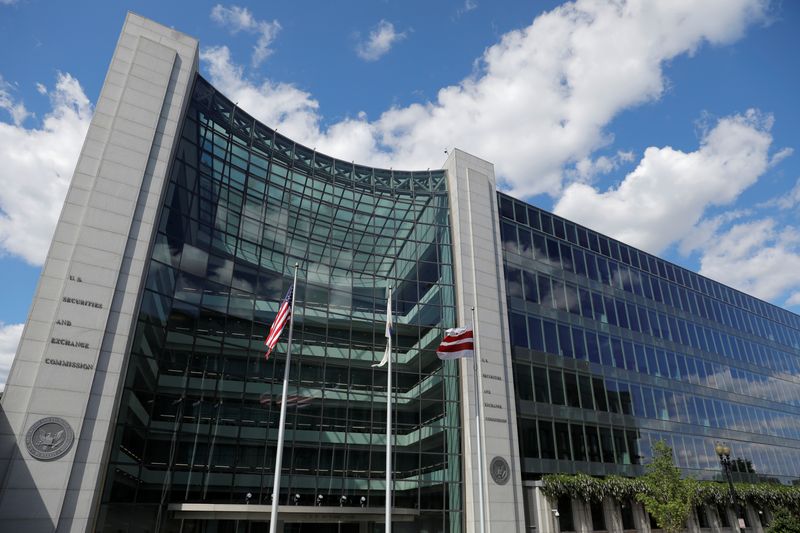By Douglas Gillison
(Reuters) - Rulemaking at the U.S. Securities and Exchange Commission, which hit a record pace early in President Joe Biden's administration, has slowed significantly as the agency navigates a hostile new legal climate.
Adverse court decisions over the past two years have blocked the SEC from overseeing the $27 trillion private funds industry; criticized its economic justification for new share buyback disclosures; and curtailed its powers to punish bad actors.
The SEC has also been affected by Supreme Court decisions curbing federal agencies' powers to interpret ambiguous laws or issue rules of major importance.
As a result, SEC officials are rethinking rulemakings and some enforcement actions to help ensure they can survive legal attacks, according to four people familiar with the matter who asked for anonymity to discuss internal SEC issues.
SEC Chair Gary Gensler has said the SEC pivots when the courts find against the agency, but the extent to which it is having to adjust is becoming clearer.
Reuters identified more than a dozen Gensler-led rules, including on private funds, climate change and diversity, which have been overturned, delayed or which are in doubt due to legal challenges and risks, according to legal experts and an analysis of court filings and the SEC's public agenda.
They show how legal attacks are hindering Wall Street's watchdog from completing what some regulatory advocates say are important safeguards in a crucial election year that will help define Gensler's legacy. Republican presidential candidate Donald Trump has pledged to fire Gensler and slash regulations if he wins the election next week.
"When the SEC does act, it's going to have to work harder to justify its position and it's going to face more skeptical courts," said Jill Fisch, a University of Pennsylvania law professor focusing on regulation and capital markets.
"That world is going to limit what any agency chair is going to be able to accomplish."
To be sure, many agencies are under legal attack from conservative and industry groups, and Gensler has notched a couple of notable victories. He has also successfully completed other major rules, including on blank check companies, stock pricing, trade settlements and Treasury markets.
"These are significant reforms in the capital markets and will leave a lasting impact that will enhance capital formation, investor protection, and market efficiency and resilience," an SEC spokesperson said.
Appointed by Biden and confirmed in 2021, Gensler quickly began implementing an ambitious agenda to boost transparency and stamp out conflicts of interest on Wall Street. In 2022, the agency proposed 30 new rules, the most in any year since the 2008 financial crisis, according to a Reuters tally.
As the SEC adopted rules, lawsuits followed. The Chamber of Commerce, Managed Funds Association (MFA) and other groups sued in the conservative-leaning Fifth U.S. Circuit Court of Appeals and elsewhere to overturn at least eight rules, arguing they were unjustified, harmful or beyond the SEC's authority.
Bryan Corbett, MFA's CEO, said in a statement the group tried to work with the SEC to improve proposals. "It's unfortunate we needed to challenge the SEC three times in court before it slowed its harried pace of rulemaking. We hope recent court decisions will lead to more meticulous rulemaking."
'GETTING THINGS RIGHT'
So far, the Fifth Circuit has overturned stock buyback disclosures, saying the agency failed to justify the rule economically, and spiked private funds transparency rules, saying the SEC does not have the authority to oversee that industry.
Those rulings undermine the SEC's ability to adopt other draft rules, including three creating guardrails around investment advisers' use of AI, outsourcing and tightening their cybersecurity controls, legal experts said. The MFA and other groups have called for the SEC to spike or overhaul those proposals in light of the private funds ruling.
The SEC will re-propose the AI rule, as well as another on funds pricing, its agenda shows. The Chamber had flagged that funds "swing pricing" rule as a potential litigation target, while investors also signaled that they would sue, said a person with knowledge of the matter.
Bill Hulse, senior vice president at the Chamber, said Gensler's SEC has pursued "potentially harmful regulations."
In September, Gensler told reporters he could not discuss a long-planned proposal promoting corporate board diversity because of a suit challenging a related SEC decision.
SEC staff consider adjusting proposals based on public feedback and advance them when they're ready, the spokesperson said, adding Gensler "is focused on getting things right."
Enforcement proceedings are also getting snarled up. Because the Supreme Court in June barred the SEC from seeking fraud penalties through in-house tribunals, the agency abandoned all its malpractice cases in August, according to a different person familiar with the matter.
Some progressives who want tough rules, including Washington group Better Markets, say Gensler has ceded too much ground to potential litigants unlikely to be appeased by half-measures. In March, the SEC watered down a climate change rule due to legal worries, Reuters reported, but industry groups sued anyway.

Luis Aguilar, a Democratic SEC commissioner from 2008 to 2015, said the recent court decisions would affect the agency, but it is still too soon to understand the long-term impact.
Referring to SEC staff, he added: "I'm confident that they will adapt."